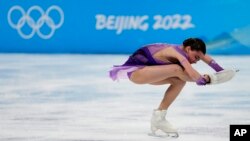Russia’s Kamila Valieva competed in Tuesday’s first round of the women’s individual figure skating competition, a day after she was cleared to continue to participate in the Beijing Winter Olympics despite testing positive for a banned substance last December.
The Court of Arbitration for Sport, or CAS, said the 15-year-old skater could compete because she was a minor or “protected person” and subject to different rules from an adult athlete. Valieva tested positive for a heart medication that has been banned by the World Anti-Doping Agency because it can potentially increase endurance.
Valieva helped the Russian Olympic Committee win the gold medal last week in the team figure skating event, and is favored to win the individual competition. But the scandal has prompted the International Olympic Committee to postpone a formal medal ceremony for the Russian team until a separate investigation is conducted, and IOC said the same would hold true if Valieva earns a medal in the individual event.
An IOC official says Valieva told the committee her positive test may have resulted because of a mix-up with her grandfather’s medication.
The CAS decision to allow Valieva to continue to participate in Beijing has drawn intense criticism in the wake of the scandal over Russia’s state-sponsored doping campaign during the 2014 Sochi Winter Olympics.
One of the most pointed criticisms came from American sprinter Sha’Carri Richardson, who was banned from taking part in last year’s Summer Olympics in Tokyo after testing positive for marijuana, which is not considered a performance-enhancing drug by WADA. Richardson compared her situation to that of Valieva in a tweet Monday, saying “The only difference I see is I’m a black young lady.”
In other competitive events Tuesday, Switzerland’s Corinne Suter won the gold medal in the women’s Alpine downhill skiing event, with Italians Sofia Goggia and Nadia Delago taking home the silver and bronze medal, respectively. American skier Mikaela Shiffrin, who failed to qualify in her first two events of the slalom and giant slalom – both of which she was favored to win the gold medal – finished in 18th place Tuesday.
In freestyle skiing, Suter’s compatriot, Mathilde Gremaud, won the gold medal in the women’s slopestyle final, edging out Eileen Gu, the American-born skier who has became a sensation after winning gold last week in the freeski Big Air event for China, her mother’s homeland. Kelly Sildaru of Estonia finished third to win the bronze medal.
In snowboarding, China’s Su Yiming won the gold medal in the men’s big air final with a final score of 182.50, well ahead of silver medalist Mons Roisland of Norway, who earned 171.75 points, and Canada’s Max Parrot, who won bronze with a score of 170.25. The women’s big air final saw Austria’s Anna Gasser winning the gold with a score of 185.50, with Zoi Sadowski-Synnott of New Zealand scoring 177.00 to take the silver medal and Japan’s Kokomo Murase winning the bronze medal with a final score of 171.50.
Norway continued to add to its overall medal count Tuesday, as compatriots Joergen Graabak and Jens Luraas Oftebro won the gold and silver medals, respectively, in the men’s Nordic Combined 10-kilometer cross country race, with Japan’s Akito Watabe taking the bronze medal.
Norway also claimed gold in the men’s team speed skating event, beating out the Russian Olympic Committee and the United States, the silver and bronze medalists, respectively. In the women’s speed skating event, Canada won the gold, with the Japanese team taking silver and the Netherlands bronze.
Another gold medal for Norway came in the men’s 4x7.5 kilometer biathlon relay. The French team took the silver medal and the Russian Olympic Committee won bronze.
Norway is leading all nations with a total 26 medals, including 12 gold. The Russian Olympic Committee is second with 20 total medals, while the U.S. and Canada are tied for third place with 17 total medals, followed by Austria with a total of 16.





